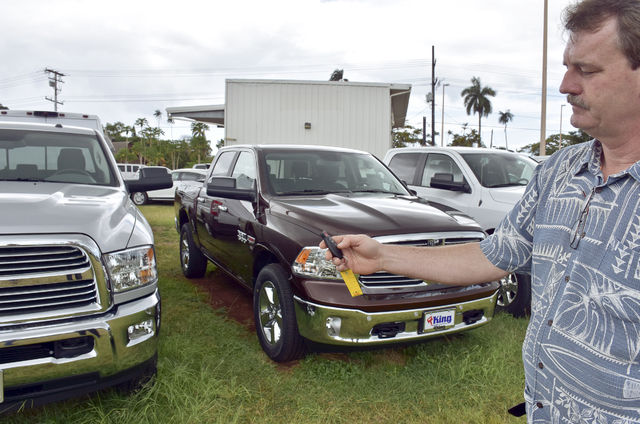LIHUE — Nearly everyone in Kekaha resident Mason Koetje’s family owns a truck. “I drive a truck, my dad drives a truck, my step-mom drives a truck, my brother drives a truck and (we have) a spare truck, too,” Koetje
LIHUE — Nearly everyone in Kekaha resident Mason Koetje’s family owns a truck.
“I drive a truck, my dad drives a truck, my step-mom drives a truck, my brother drives a truck and (we have) a spare truck, too,” Koetje said. “My other family – my mom has a car, my step-dad has truck and Jeep and car.”
First-quarter data from Hawaii Auto Outlook shows that 69 percent of new vehicles sold on Kauai are of the light truck category — sport utility vehicles, pickup trucks and minivans.
“Kauai has sold more in the truck category than the car category – of all the islands you’ve always led in difference between cars and trucks sold,” said David Rolf, executive director of the Hawaii Auto Dealers Association.
Statewide, coming in at number two for light trucks sold, is Maui at 60.7 percent, Hawaii Island number three at 59.6 percent and Oahu at 50 percent. Overall, there is a 4.2 percent increase in light trucks sold for the first quarter of this year (7,030) compared to last year (6,749). Light truck sales make up 51.2 percent of the market, while car sales make up 48.8 percent.
The top-selling brands statewide are Toyota (32 percent), Honda (18.3 percent), Nissan (9.5 percent) and Ford (6.8 percent).
Kauai is up 3 percent in sales in the light truck category this quarter compared to the first quarter of last year.
“I found it interesting that Kauai again shows up on the charts as having a higher proportion of trucks,” Rolf said. “It’s a near seven out of 10 new (vehicles) sold on Kauai are in the light truck category;.”
He said Kauai traditionally has sold more in that category than the other islands.
Ryan Mackey, general manager at Kuhio Motors in Lihue, attributes the outdoor lifestyle of the people on Kauai as one reason for high truck sales.
“When you do the activities that Kauai people do – going to the beach and swimming and bringing chairs and biking, hiking, paddling – sedans don’t work for those kinds of activities on Kauai,” Mackey said.
Koetje, owner of a Nissan Frontier and office manager at Joel Koetje Construction, said having his truck is practical for his and his family’s way of living.
“I fish, so breaking down poles and putting them in a car really doesn’t work,” he said. “I also have a boat. Towing a boat with a car really doesn’t work: You can’t put it on the boat ramp and try to get out. (We) race down at the drag strip at Kauai Raceway Park and to be able to move trailers and take in lights at the end of the race day – I mean — that’s all important as far as daily activities.”
Mackey said construction “plays a huge role” in truck sales as well.
“For car and truck sales on Kauai and in the state of Hawaii, construction plays a huge role on our success,” he said. “Now (contractors) are busier and making more money from what I see and hear … (contractors) are slowly coming back into the market.”
Koetje said one couldn’t own a car and be in the construction business on Kauai.
“Your car would be dirty, smashed up, beat up and there are a lot of times where you’re carrying paint or gas or something that has to be outside to vent,” he said. “Having something like that inside your car would be dangerous – let alone carrying a big sheet of plywood really isn’t practical to put it on the car, too.”
Koetje, however, said gas mileage is a disadvantage to owning a truck.
“If I drove a car and truck in equal parts, the truck gets 15 miles to the gallon; my Honda (Civic) would get 30,” he said.
Aaris Berry, general sales manager at Kuhio Motors, said other reasons people are buying trucks are because of lower gas prices and better fuel efficiency in newer-model trucks.
“The gas prices going down has helped, but also the trucks have become a lot more fuel efficient as well,” he said. “Not only gas prices down but fuel economy going up ultimately makes the vehicle that most families want more affordable.”
Berry added that his company “definitely sells more trucks and SUVs than passenger vehicles” by a margin of two to one.
“You gotta have (a truck) in every household – just to make sense for you on Kauai. I think that everybody agrees with that,” he said. “If you don’t have a truck, then you’ll sure know a friend or family member that’s gonna let you use one pretty often.”
Road conditions and safety features are other contributing factors for consumers, according to Mackey.
“The road conditions with potholes and stuff like that, a lot sedans take a beating with the road conditions,” Mackey said. “Having a truck, it sits up higher. Also with the safety with the head-on collisions that are happening, I think a lot of people feel safer being a little higher.”
Koetje agreed with Mackey.
“Your tires are bigger, you go over potholes, you don’t dent rims, you don’t bottom out, you don’t scrape your exhaust; you’re higher so you just glide on over,” he said. “While they’re doing road work, there are big things you gotta avoid. With trucks, you’re better off.”


